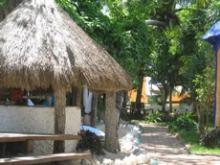The life of an anthropologist is full of contradictions, delicious food, and once in a while, conferences in sunny locations. This spring, these three things collided for Teresa Mares as she escaped the Seattle rain for ten precious days and attended the meetings of the Society for Applied Anthropology in Mérida, Mexico (of course, a few days had to be spent “writing her dissertation” on the beach after the conference ended). As a doctoral candidate writing about the food strategies that Latino/a immigrants living in Seattle practice to address their dietary and cultural needs, attending a conference in the country where a majority of her research participants were born forced her to pause and reflect upon the inequalities of a selectively permeable border between the United States and Mexico. Rather than offering a “notes from the field” sort of update, she would like to share the kinds of theoretical and methodological questions that her experiences in the Yucatan have inspired her to (re)consider as she concludes her dissertation:
How is it that I, a U.S. born and trained scholar, have no problems crossing the very same border to present my research findings that many of my Mexican participants have had to cross under the cover of darkness in search of work? What are the structural conditions and privileges that allow me, as an anthropologist, to contemplate the displacement of Mexican farmers and the effects of citizenship on people’s food access from the comfort of a hammock hanging twenty feet from the Mexican coastline? How can I, as an anthropologist who is committed to community-based engagement, contribute to the unraveling of food injustices that my research participants confront on a daily basis?
The answers to these questions certainly expand beyond the small space that she has been asked to fill in this issue of e-Anthropolog(and most likely, the pages of her dissertation) but they do point us to a set of global inequalities that are uniquely analyzed through an anthropological approach grounded in local communities. Striving to be a community-based ethnographer entails a constant balancing act between remaining compassionately critical of the minutiae of ethnographic detail and keeping in mind a bigger picture of social justice, as we work towards that bigger picture through our research, writing, and teaching. As Teresa looks ahead to a summer dissertation defense and the beginning of her postgraduate life, she hopes to achieve a better balance and make more sense of the contradictions and inequalities that have been illuminated through her fieldwork and the narratives of her research participants.
For more information about Teresa’s dissertation, please visit:http://students.washington.edu/tmares/research.html
